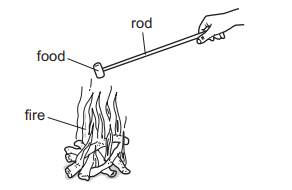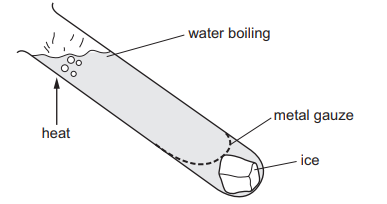Question
Four samples of materials with the same dimensions are tested.
Which material gives the highest rate of thermal conduction?
rubber
copper
plastic
steel
Answer/Explanation
Ans: B
Question
Two students carry out different experiments to compare the abilities of different metals to conduct thermal energy.

In experiment 1, the bar is heated for one minute and the length of wax strip that melts is measured.
In experiment 2, the bar is heated and the time taken for the pin to drop off is measured.
What happens to each of these measurements when a better conductor of thermal energy is tested?
| length of melted wax strip | time taken for the pin to drop |
A | decreases | decreases |
B | decreases | increases |
C | increases | decreases |
D | increases | increases |
Answer/Explanation
Ans: C
Question
Four campers are warming their food on a fire.
They use different rods, each of the same dimensions, to hold their food near the fire.

Which material is the best choice to prevent their hands from getting too hot?
aluminium
copper
steel
wood
Answer/Explanation
Ans: D
Question
In which does thermal conduction not occur?
a gas
a liquid
a solid
a vacuum
Answer/Explanation
Ans: D
Question
Ice is trapped by a metal gauze at the bottom of a tube containing water.
The water is heated strongly at the top, but the ice only melts very slowly.

Why does the ice melt so slowly?
Heat energy always travels upwards.
Hot water is more dense than cold water.
Metal gauze does not allow heat to pass through.
Water is a poor conductor of heat.
Answer/Explanation
Ans: D
